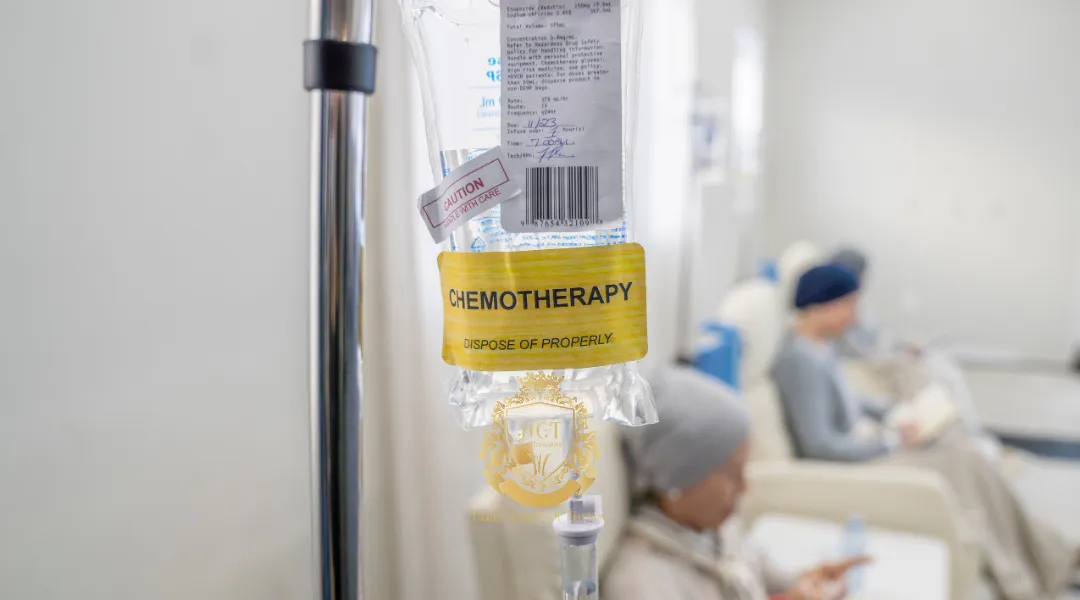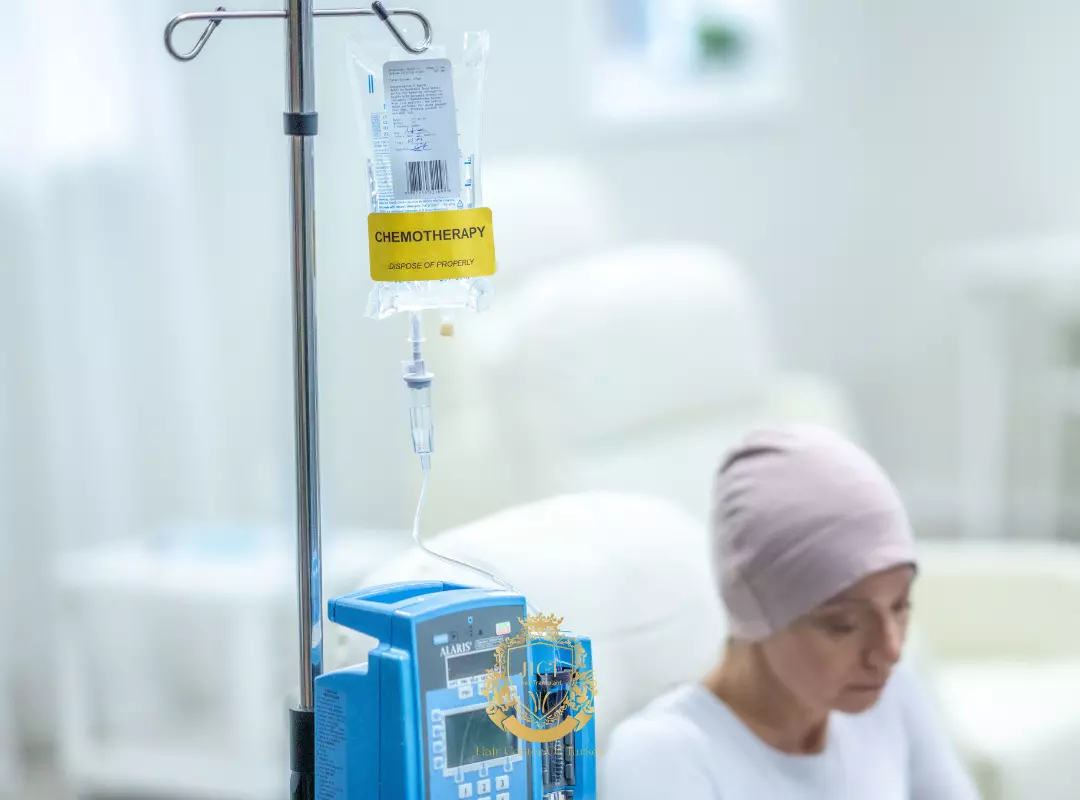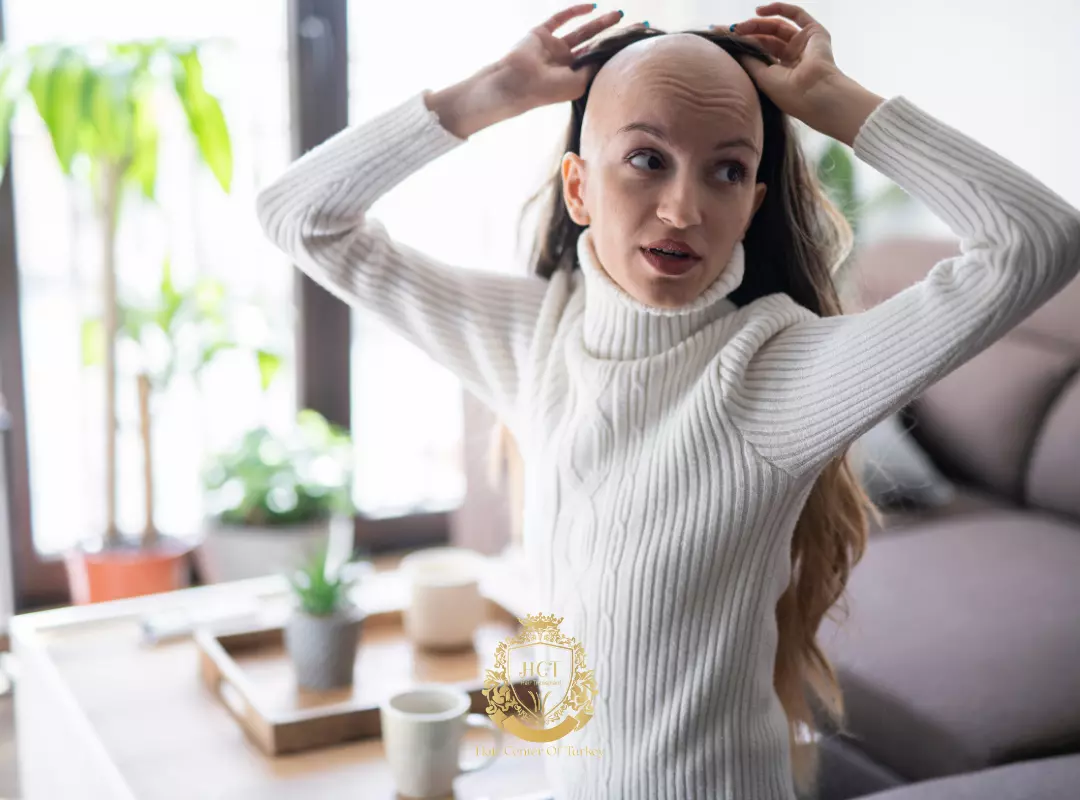
Hair Transplant After Chemotherapy
Hair loss from chemotherapy is usually temporary. Most people notice shedding 2–4 weeks after treatment starts, and regrowth often begins within 3–6 months after chemotherapy ends. If hair doesn’t return fully or you’re left with persistent thin areas, a hair transplant may be an option once treatment is completed and your oncology team confirms you’re medically ready.
Table of Contents
What Is Chemotherapy?
Chemotherapy is a cancer treatment that uses medicines to destroy cancer cells or stop them from growing and dividing. It can be given through a vein (IV), as tablets, or in other ways depending on the treatment plan.
Because chemotherapy targets fast-growing cells, it can also affect healthy cells that divide quickly, including hair follicle cells. That’s why hair loss is a common side effect for many patients.

Why Is Chemotherapy Used?
Chemotherapy may be recommended to:
- Destroy cancer cells
- Shrink a tumor before surgery or radiotherapy
- Reduce the risk of cancer returning
- Slow or control cancer growth
- Ease symptoms and improve comfort in advanced cases
Your oncologist decides the approach based on cancer type, stage, and overall health.
Hair Loss After Chemotherapy
Hair loss during chemotherapy is caused by the medications, not the cancer itself. Shedding often begins 2–4 weeks after starting chemotherapy, though timing can vary by drug and dosage.
Hair loss may affect the scalp as well as eyebrows, eyelashes, beard, and body hair. Some people experience mild thinning, while others lose most of their hair.
Not every chemotherapy regimen causes noticeable hair loss, and the degree of shedding differs from person to person.

When Does Hair Grow Back?
For many patients, hair starts to grow back within a few months after chemotherapy ends. Visible regrowth is commonly seen in the 3–6 month range, and texture or curl patterns can temporarily change during early regrowth.
In a smaller number of cases, hair regrowth is incomplete or slower than expected (sometimes called persistent chemotherapy-induced alopecia).
How To Cope With Chemo-Related Hair Loss
Hair loss can feel deeply personal and emotionally draining. These steps can make the process more manageable:
Choose Comfort First
Soft cotton caps, scarves, or bandanas can reduce irritation, especially if your scalp feels tender.
Keep Hair Care Gentle
Use mild, fragrance-free shampoos. Avoid high heat (straighteners, curling irons, hot blow-drying) and harsh chemicals while your scalp is sensitive.
Protect Your Scalp
Sun and cold can be uncomfortable during treatment. A breathable hat or scarf helps in both warm and cold weather.
Consider Support
Online support groups or talking with someone who has been through treatment can help you feel less alone.
Can Hair Loss Be Prevented During Chemotherapy?
There is no guaranteed way to prevent chemotherapy-related hair loss. That said, scalp cooling (cold caps) can reduce hair loss for some patients, depending on the chemotherapy drugs used. Ask your oncology team whether it’s suitable for your treatment plan.
Can A Hair Transplant Be Done After Chemotherapy?
A hair transplant may be considered after chemotherapy is fully completed when:
- Your oncology team confirms you’re medically stable
- Blood values and immune recovery are adequate
- Hair regrowth has had time to declare itself
- There is enough healthy donor hair (usually at the back and sides of the scalp)
Many people regain most of their hair naturally, so the first step is usually to wait and reassess after regrowth begins. If thin or patchy areas persist, a consultation with a dermatologist and a hair restoration physician can help confirm whether transplantation is appropriate.
If your hair loss does not follow the typical regrowth pattern, it may fall into the category of persistent chemotherapy-induced alopecia, which should be evaluated before planning any procedure.
Hair Loss After Chemotherapy: 10 Things To Know
1) What causes hair loss during cancer treatment?
Chemotherapy medicines can damage rapidly dividing hair follicle cells, leading to shedding.
2) How long does it take to grow back?
Regrowth often begins within a few months after chemotherapy ends, with more visible regrowth commonly seen within 3–6 months.
3) Will hair come back different?
It can. Some people notice temporary changes in texture (including “chemo curls”) or color during early regrowth.
4) Can supplements speed up growth during chemotherapy?
Never start supplements during active cancer treatment without your oncology team’s approval, as some may interact with treatment.
5) Can I stop hair loss once it starts?
There’s no reliable at-home method that stops chemo-related shedding. Scalp cooling may help some patients when used under medical guidance.
6) Are “natural oils” safe on a sensitive scalp?
During treatment, the scalp can be reactive. Patch-test anything new and keep routines gentle. If irritation occurs, stop and ask your care team.
7) Does everyone lose hair with chemotherapy?
No. Hair loss depends on the specific drugs and dose, and some regimens cause little or no hair loss.
8) When does shedding usually begin?
Often 2–4 weeks after starting treatment.
9) Will wearing a wig damage my scalp?
Wigs are generally safe, but comfort matters. In hot weather, lighter options like scarves or caps may feel better.
10) Does stress cause cancer?
Stress can affect well-being, sleep, and coping, but it’s not considered a proven direct cause of cancer on its own.
FAQ
Can you have a hair transplant after chemotherapy?
Yes, after oncologist clearance and stable regrowth, usually 6–12 months post-chemo.
What helps hair growth after chemo?
Time, gentle care, protein/iron repletion, and doctor-approved minoxidil can help regrowth.
How long does it take for hair to grow back after chemo?
New growth usually starts 3–6 weeks, with fuller regrowth by 6–12 months.
Does insurance cover hair transplant after chemo?
Usually no; insurers deem it cosmetic, except rare reconstructive medical-necessity cases.
Does your body ever fully recover from chemotherapy?
Many people recover well, but some have late or lasting effects years later.
What happens 20 years after a hair transplant?
Transplanted hair usually remains, but native hair thins, so density may decrease.




